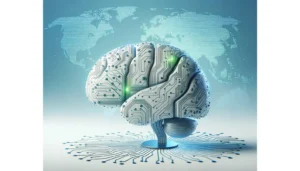Importance of the digital economy in the 21st century
The digital economy it is fundamental in the 21st century by transforming how we produce, distribute and consume goods and services globally.
This economy is based on digital technologies that have eliminated physical and temporal barriers, promoting one global connectivity unprecedented.
Additionally, it promotes sustained growth by integrating innovations that improve efficiency across multiple economic sectors.
Transformation of production, distribution and consumption
The digital economy modifies production processes by incorporating technologies such as artificial intelligence, increasing the speed and quality of products.
It also revolutionizes distribution, facilitating access to international markets through online platforms that connect suppliers and consumers.
In consumption, it allows users to access products and services 24/7, completely changing their habits and expectations.
Elimination of barriers and global connectivity
Digital technologies have eliminated many traditional barriers, such as geographic distances, allowing real-time business interactions.
The global connectivity facilitated by the internet and social networks creates an ecosystem where emerging companies can compete internationally.
This democratizes market access and encourages broader participation in the global economy, creating opportunities for all.
Key technologies in the digital economy
The digital technologies they are the engine that drives the digital economy, transforming sectors and generating new economic opportunities.
These technologies enable efficient data management, process automation and instant global communication, essential for growth.
Understanding them is key to taking advantage of their benefits and adapting to an increasingly competitive and dynamic economic environment.
Artificial intelligence and Big Data
The artificial intelligence and the Big data they are essential for massive data analysis, allowing predictions and informed decision making.
These technologies optimize complex processes, improve service personalization and support innovation in various sectors such as healthcare, finance and commerce.
In addition, they facilitate the development of intelligent systems that learn and adapt, increasing business efficiency and productivity.
Internet of Things and online platforms
The Internet of Things (IoT) connects physical devices to the Internet, allowing data collection and management in real time.
This improves the monitoring and automation of industrial, agricultural and urban processes, generating greater efficiency and sustainability.
Online platforms, on the other hand, facilitate access to services and products, creating a digital space where consumers and companies interact.
E-commerce and social networks
The e-commerce it has revolutionized the way we buy and sell, eliminating geographical and temporal barriers for business.
The social networks they act as direct marketing channels, allowing companies to connect with customers and build communities.
These tools enhance visibility, loyalty and market expansion, transforming the global commercial landscape.
Economic and social impact
The digital economy has had a profound impact on the global economy, generating employment and promoting innovation in multiple sectors.
In addition, it has democratized access to markets, allowing small and medium-sized companies to compete globally.
This phenomenon not only transforms the economy, but also influences the social structure, modifying the interaction between economic actors.
Job generation and innovation
The digital economy creates new jobs in areas such as technological development, data analytics and digital services.
This transformation drives innovation, as it encourages the creation of new products and services, adapting to market demands.
Likewise, it promotes entrepreneurship and the development of digital skills essential for the current and future economy.
Democratization of market access
Thanks to digital technologies, entrepreneurs and small businesses can access global customers without high entry costs.
This contributes to reducing inequalities, facilitating the participation of various economic actors in previously inaccessible markets.
Thus, the digital economy expands business opportunities and enhances inclusive economic development worldwide.
Challenges and challenges of the digital economy
The digital economy faces important challenges that require attention to guarantee their sustainable and equitable development. Rapid technological evolution requires constant adaptation of regulations and policies.
Furthermore, digital infrastructure is essential for access and operation, but its unequal distribution limits the reach of many economic actors.
Overcoming these challenges is key to consolidating an inclusive digital economy that benefits all sectors and regions.
Need for regulation and governance
The digital economy requires a clear regulatory framework to protect rights, prevent abuses and promote fair competition. Governance must adapt to new technological realities.
Without effective regulation, issues such as unequal access, compromised data privacy, and the proliferation of unfair business practices can arise.
Therefore, governments and international organizations work to design policies that balance innovation and security.
Digital infrastructure unit
The functioning of the digital economy depends largely on one robust technological infrastructure, such as telecommunications networks and data storage systems.
Lack of access to this infrastructure in rural areas or developing countries limits economic participation and growth due to digital divides.
Investing in infrastructure and emerging technologies is essential to reduce inequalities and enhance the global impact of the digital economy.






